If you thought only men could have hemophilia, you’re not alone. It was long believed that women who carry the hemophilia gene do not experience symptoms. We now know that’s not true. Let’s dive in a bit deeper to learn more about women and hemophilia.
Hemophilia’s effects on women.
Hemophilia’s effects on women.
If you thought only men could have hemophilia, you’re not alone. It was long believed that women who carry the hemophilia gene do not experience symptoms. We now know that’s not true. Let’s dive in a bit deeper to learn more about women and hemophilia.

How women inherit and pass on the hemophilia gene.
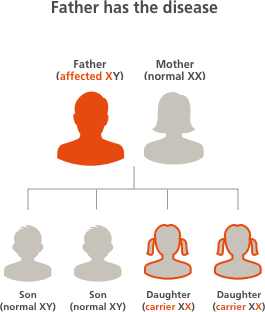
If a girl’s father has hemophilia, he will pass on the hemophilia gene to her—she is then a carrier of the gene.
If a girl’s father has hemophilia, he will pass on the hemophilia gene to her—she is then a carrier of the gene.
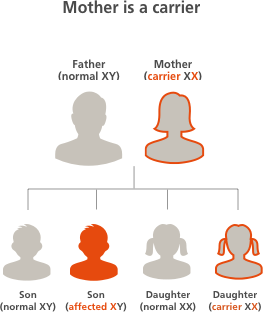
Women who are carriers can pass along a copy of the gene to their children. A carrier’s sons have a 50% chance of hemophilia and her daughters have a 50% chance of being carriers.
Women who are carriers can pass along a copy of the gene to their children. A carrier’s sons have a 50% chance of hemophilia and her daughters have a 50% chance of being carriers.
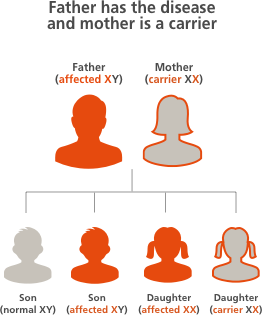
A daughter who is born to a father with hemophilia and a mother who is a carrier can inherit the severe form of the disease—but this is extremely rare.
A daughter who is born to a father with hemophilia and a mother who is a carrier can inherit the severe form of the disease—but this is extremely rare.
Symptomatic and asymptomatic carriers.
You may have heard these terms before—but what do they mean? Simply put, a symptomatic carrier has low factor levels and experiences bleeding symptoms. An asymptomatic carrier doesn’t experience any bleeding symptoms—and may not even know she’s a carrier.
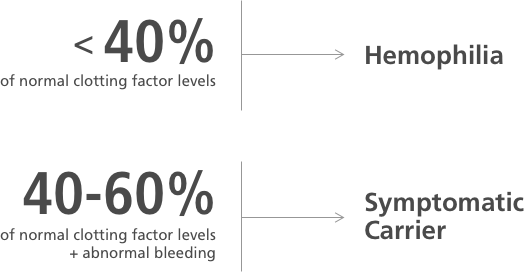
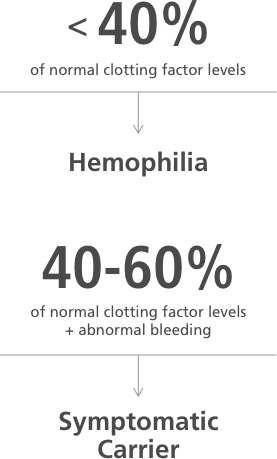
HEMOPHILIA FACT
The daughters, sisters, mothers, maternal grandmother, aunts, nieces, and female cousins of carriers are all possible carriers, too.
The daughters, sisters, mothers, maternal grandmother, aunts, nieces, and female cousins of carriers are all possible carriers, too.

Women’s bleeding symptoms.
Did you know that approximately one-third of women who are carriers have clotting factor levels of less than 60% of normal and may experience abnormal bleeding? In most cases, their symptoms are similar to those seen in men with mild hemophilia, along with women-only symptoms like prolonged or heavy menstrual bleeding.
HEMOPHILIA FACT
Many carriers are not aware that their symptoms are abnormal and do not seek medical advice.
Many carriers are not aware that their symptoms are abnormal and do not seek medical advice.
Compared with those without the hemophilia gene, women with the gene have higher-than-average rates of:
Bruising
Longer bleeding from small wounds and after surgical procedures such as tooth extraction or tonsillectomy
Joint bleeds and joint damage
Heavy menstrual bleeding (menorrhagia)—which may lead to excessive blood loss and anemia
Heavy or longer bleeding after giving birth
HEMOPHILIA FACT
Many carriers are not aware that their symptoms are abnormal and do not seek medical advice.
Many carriers are not aware that their symptoms are abnormal and do not seek medical advice.

Considerations for women with hemophilia.
If you’re a woman with hemophilia, your health care providers are the best people to talk to about your symptoms—as well as your questions about childbirth, surgery, or the possibility of passing the gene to your children.
Talk to your gynecologist or a hematologist for more information about low factor levels, having a baby, and potential treatment options
Find a hematologist or hemophilia treatment center that treats women with hemophilia and/or bleeding disorders
Search for an OB/GYN with hemophilia experience
Explore support groups for women with hemophilia, such as the National Hemophilia Foundation’s (NHF’s) Victory for Women initiative, which provides support, education and resources
Contact your local NHF chapter for more information

Considerations for women with hemophilia.
If you’re a woman with hemophilia, your health care providers are the best people to talk to about your symptoms—as well as your questions about childbirth, surgery, or the possibility of passing the gene to your children.
Talk to your gynecologist or a hematologist for more information about low factor levels, having a baby, and potential treatment options
Find a hematologist or hemophilia treatment center that treats women with hemophilia and/or bleeding disorders
Search for an OB/GYN with hemophilia experience
Explore support groups for women with hemophilia, such as the National Hemophilia Foundation’s (NHF’s) Victory for Women initiative, which provides support, education and resources
Contact your local NHF chapter for more information

What about genetic testing?
Genetic testing can tell if you have the hemophilia gene, but not how much you’re at risk for bleeding. Talk to your doctor about whether testing is the right step for you.
Visit the World Federation of Hemophilia website for more info.

What about genetic testing?
Genetic testing can tell if you have the hemophilia gene, but not how much you’re at risk for bleeding. Talk to your doctor about whether testing is the right step for you.
Visit the World Federation of Hemophilia website for more info.
Tips for living with hemophilia.
Get tips on managing bleeds and pain, keeping joints healthy, caring for children with hemophilia, and exercising safely.
Connect and learn.
Connect with others and learn the facts at a workshop developed just for women with hemophilia.
Tips for living with hemophilia.
Get tips on managing bleeds and pain, keeping joints healthy, caring for children with hemophilia, and exercising safely.
Connect and learn.
Connect with others and learn the facts at a workshop developed just for women with hemophilia.
